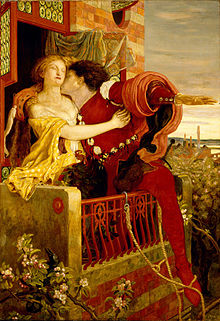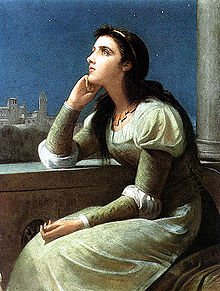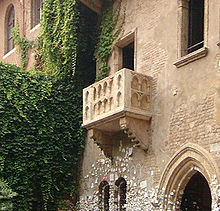- Juliet
-
This article is about the Shakesperean character. For other uses, see Juliet (disambiguation).
Juliet 
The balcony scene in Romeo and Juliet as depicted by Ford Madox Brown in an 1870 painting.Creator William Shakespeare Play Romeo and Juliet Family Associates The Nurse Role Protagonist Juliet is one of the title characters in William Shakespeare's tragedy Romeo and Juliet, the other being Romeo. She is the daughter of old Capulet, head of the house of Capulet. The story has a long history that precedes Shakespeare himself.
Contents
Relationships
The play takes place over a time span of four days. Within these few days, Juliet is thrust into adulthood quickly—where she must deal with issues of life, love, passion, and even death. During the play she is courted by a potential husband (Count Paris), falls in love with another (Romeo), marries Romeo secretly, experiences the death of her cousin Tybalt, has one brief passionate night with her new husband before he is forced to leave the city, is threatened by her father and nearly disowned by both of her parents for refusing to marry the man they have chosen for her, she is emotionally betrayed by the nurse who raised her from infancy, spends nearly two days drugged to unconsciousness, is widowed, and ultimately commits suicide near the body of her dead husband.
Shakespeare's Juliet is a headstrong and intelligent character in spite of her young age, though she often seems timid to the audience because of her young age. She is considered by many to be the true hero of the play, acting as a sounding board and a balance against the impulsive Romeo. It is Juliet who sets the boundaries of behavior in her relationship with Romeo: she allows him to kiss her, she pledges her commitment before him, and it is she who suggests their marriage. Juliet's forgiveness of Romeo after he kills Tybalt indicates her mature nature in contrast to his passionate impulsiveness. Furthermore, Juliet lies and clandestinely subverts her family's wishes, a truly rebellious action against traditional Italian society. These actions and the choices they require establish Juliet as a far more complex character than her family, or even Romeo, appreciate.
Character history
Juliet's wealthy and rich family lived in Verona, headed by old Capulet and his wife. She was their youngest child. She apparently had older siblings at some point, but by the time of the play, she was their only surviving child. As a child, she was cared for by her nurse, who is now her confidante, or Juliet's caretaker.
In Juliet's first scene, she demonstrates her obedience and lack of experience in the world, outlining herself as inexperienced and in many ways dependent on her parents and nurse. She has not given marriage a second thought but she does want to do what her mother asks. It is high time that Juliet go the route Lady Capulet went in her youth, and be married to a rich and powerful gentleman like her father. The Count Paris is a bit of a bystander in the play however, unwittingly mixed up in the drama between the families. He and Juliet have probably never even met as the play unfolds. His interest in her is primarily based on her social standing and her family's vast wealth, in contrast to her youthful beauty. He politely and nobly asks Capulet for her hand, and apparently would like her to begin bearing his children as soon as physically possible: "Younger than she are happy mothers made" (I.ii.12). Juliet, on the other hand, has no interest in becoming a wife and the mother of Paris's children: "(Marriage) is an honour that I dream not of" (I.iii.68). Even her father at first considers her too young to settle down. This may be a reflection on his feelings about his own wife, who might have been happier waiting a few years before marrying him. He tells Paris to let Juliet grow up for a few more years before planning marriage, but he pompously disagrees (I.ii.10–11). Of course, Juliet's mind on the matter changes within a few minutes of meeting Romeo, but when Paris is mentioned to her by her mother in act three she reverts back to an immature, whining, almost infantile state. Romeo's very presence seems to propel her toward maturity however, and her decisions are made quickly but thoughtfully from that point forward.
O Romeo, Romeo! Wherefore art thou Romeo?
Deny thy father and refuse thy name;
Or, if thou wilt not, be but sworn my love,
And I’ll no longer be a Capulet.Romeo too seems to achieve depth through his intense love with Juliet. When compared to the pining and frustration he exhibited during his crush on Rosaline, his behavior toward Juliet and her family and his attitude in general both show a level of great maturity. The feud that one day had seemed all-encompassing now makes no sense, and he abandons it. Much of Romeo's dialogue with Juliet is an intricate pattern of words. Their rhyming couplets sometimes come together to create a poem. This symbolizes their union, and shows that Juliet can easily match Romeo in wordplay.
It is not clear exactly why Romeo and Juliet love each other, beyond immediate physical attraction. They were married not 24 hours after their first meeting. Fate plays a constant role in the story. Their love is "death-marked" (I.I.9), the lovers are "star-crossed" (I.I.6), and Romeo feels he is being led by the stars as a ship is steered by its pilot. The idea may be that the heirs to these two families were fated to end up together to end the feud, and their deaths may or may not have been part of that fate. The play may be interpreted differently according to the whim of the reader or viewer. The series of disastrous events that leads to their deaths may have been just a part of the destiny, or it may have been what shattered the fate and made the story a true tragedy. Either way, peace comes to the families.
Juliet's age
One aspect of the story which now seems problematic is Juliet's age. As the story occurs, Juliet is approaching her fourteenth birthday. She was born on "Lammas Eve at night" (August 1), so Juliet's birthday is July 31 (1.3.19). Her birthday is "a fortnight hence", putting the action of the play in mid-July (1.3.17). Her father states that she "hath not seen the change of fourteen years" (1.2.9). In many cultures and time periods, women did and do marry and bear children at such a young age. Romeo and Juliet is a play about Italian families. The average English playgoer in Shakespeare's audience had never met an Italian person, and it was commonly thought that they were quite exotic, the Italian male passionate and emotional, and the Italian female precocious and quite ready to become a mother by thirteen. Lady Capulet had given birth to Juliet by the time she had reached Juliet's age: "By my count, I was your mother much upon these years that you are now a maid" (1.3.74–75). The play celebrates youth while pointing out its impulsiveness, passion, and idealism; qualities which contribute to the tragedy. The adolescent infatuation of the lovers becomes elevated to the status of sacred love.
This aspect of the story appears to be Shakespeare's invention, since Juliet is approaching her sixteenth birthday in Arthur Brooke's poem, his main source.
In today's Verona
Casa di Giulietta
In Verona, a house claiming to be the Capulets' has been turned into a tourist attraction. It features the balcony, and in the small courtyard, a bronze statue of Juliet. It is one of the most visited sites in the town. The metal of its chest is worn bare due to a legend that if a person strokes the right breast of the statue, that person will have good fortune.[2]
Many people write their names and the names of their beloved ones on the walls of the entrance, known as Juliet's wall. Many believe that writing on that place will make their love everlasting. After a restoration and cleaning of the building, it was intended that further writing should be on replaceable panels[3] or white sheets[4] placed outside the wall.
It is also a tradition to put small love letters on the walls (which is done by the thousands each year), which are regularly taken down by employees to keep the courtyard clean.[5]
Club di Giulietta
Since the 1930s, letters addressed to Juliet keep arriving in Verona. As of 2010, more than 5,000 letters are received annually, three quarters of which are from women. The largest single group of senders are American teenagers.[6] The letters are read and replied to by local volunteers, organized since the 1980s in the Club di Giulietta (Juliet Club), which is financed by the City of Verona.[6] The club has been the subject of a book by Lise and Ceil Friedman and is the setting for a 2008 book by Suzzane Harper and a 2010 USA movie, Letters to Juliet.
Performers
A number of famous actresses have portrayed the role of Juliet:
- Mary Saunderson was the first woman to play Juliet professionally. Previous actors had all been males.[7]
- Eliza O'Neill won her fame with Juliet at Covent Garden, 1814.
- Katharine Cornell had a notable Broadway success as Juliet opposite the Romeo of Basil Rathbone in 1934, and revived the production with Maurice Evans as Romeo and Ralph Richardson as Mercutio the following year.
- Peggy Ashcroft was one of the great Juliets in history, most famously in the 1935 London production directed by John Gielgud, in which Gielgud and Laurence Olivier alternated the roles of Romeo and Mercutio.
- Norma Shearer in George Cukor's Romeo and Juliet (1936). Leslie Howard was her Romeo.
- Judi Dench had a great success as Juliet in Franco Zeffirelli's 1960 London production.
- The 1961 musical film West Side Story starred Natalie Wood as Maria, the Juliet analogue.
- Olivia Hussey portrayed Juliet in Zeffirelli's 1968 film, Romeo and Juliet,; Leonard Whiting was her Romeo.
- Niamh Cusack portrayed Juliet in 1986 with The Royal Shakespeare Company. Sean Bean was her Romeo.
- Claire Danes was Juliet in Baz Luhrmann's modernized 1996 version, Romeo + Juliet, alongside Leonardo DiCaprio as Romeo.
- Gugu Mbatha-Raw portrayed Juliet at the Royal Exchange Theatre's 2005 production.
- Hailee Steinfeld will portray Juliet in Carlo Carlei's upcoming film adaptation opposite actor Douglas Booth as Romeo.[8]
Animation
- In Romeo & Juliet: Sealed with a Kiss, Juliet is portrayed as a white seal and is voiced by Patricia Trippett while her brother Daniel did the voicing of the brown seal Romeo.
- Fumie Mizusawa voices Juliet in the heroic-fantasy adaptation Romeo x Juliet by the Japanese animation studio GONZO, with Takahiro Mizushima voicing Romeo; Brina Palencia and Chris Burnett portrayed the characters in the English-language version.
Fictional performers
- The Academy Award-winning film Shakespeare in Love depicts history's first Juliet as being illegally played by Viola de Lesseps, a woman (Gwyneth Paltrow).
- In her music video Love Story, American singer-songwriter Taylor Swift played the part of Juliet. The plot was transformed to a happy ending, instead of tragic.
- In the credits of Toy Story 3, one of the Squeeze Toy Aliens/LGMs play the role of Juliet dressed up in a dress, a wig and a princess hat.
- In the climax of "Casting Call" from The Mysteries of Alfred Hedgehog, after Camille Wallaby who is beautifully dressed solves the mystery with Alfred and Milo, she is chosen to be the perfect Juliet by saying her famous words.
Notes
- ^ "Act 2 Scene 2". OpenSourceShakespeare.org. http://www.opensourceshakespeare.org/views/plays/characters/charlines.php?CharID=juliet&WorkID=romeojuliet&cues=0&longlines=1. Retrieved 2011-11-04.
- ^ La casa di Giulietta, Verona – IgoUgo
- ^ Veronissima. "Veronissima – Juliet's Wall Graffiti". Veronissima.com. http://www.veronissima.com/sito_inglese/html/shakespeare-verona-juliet-graffiti.html. Retrieved 2011-11-04.
- ^ "Terna02 – Juliet’s graffiti at the D'Orsay Museum in Paris". PremioTerna.it. 2009-09-04. http://www.premioterna.it/en/new/juliet%E2%80%99s--graffiti-at-the--d-orsay-museum-in-paris. Retrieved 2011-11-04.
- ^ "Desenzano Lake Garda Italy — Verona — Romeo and Juliet". DesenzanoItaly.com. http://www.desenzanoitaly.com/romeo_and_juliet.html. Retrieved 2011-11-04.
- ^ a b Hooper, John (19 May 2010). "Dear Juliet: the fans who write to Shakespeare's heroine". The Guardian. http://www.guardian.co.uk/world/2010/may/19/dear-juliet-letters-shakespeares-heroine. Retrieved 20 May 2010.
- ^ Halio, Jay (1998). Romeo and Juliet. Westport: Greenwood Press. p. 100. ISBN 0-313-30089-5.
- ^ Sneider, Jeff (2011-06-21). "Douglas Booth, thou art 'Romeo'". Variety. http://www.variety.com/article/VR1118038903. Retrieved 2011-11-04.
References
- Bevington, David, Ed. Romeo and Juliet, The Bantam Shakespeare (New York, 1988)
- Levenson, Jill L., Ed. Romeo and Juliet, The Oxford Shakespeare (Oxford, 2000)
Further reading
- "Juliet's Taming of Romeo" Carolyn E. Brown; Studies in English Literature, 1500–1900, Vol. 36, 1996
- "A Psychological Profile of Shakespeare's Juliet: Or Was It Merely Hormones?" Nancy Compton Warmbrod The English Journal, Vol. 69, No. 9 (Dec., 1980), p. 29
External links
Categories:- Fictional characters introduced in 1597
- Fictional Italian people in literature
- Female Shakespearean characters
- Characters in Romeo and Juliet
- Fictional people who committed suicide
Wikimedia Foundation. 2010.




